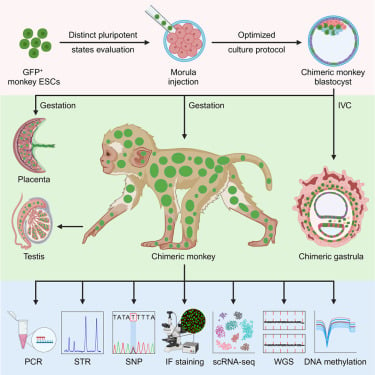Ed... Ward...
Technology
This is a most excellent place for technology news and articles.
Our Rules
- Follow the lemmy.world rules.
- Only tech related news or articles.
- Be excellent to each other!
- Mod approved content bots can post up to 10 articles per day.
- Threads asking for personal tech support may be deleted.
- Politics threads may be removed.
- No memes allowed as posts, OK to post as comments.
- Only approved bots from the list below, this includes using AI responses and summaries. To ask if your bot can be added please contact a mod.
- Check for duplicates before posting, duplicates may be removed
- Accounts 7 days and younger will have their posts automatically removed.
Approved Bots
"Yeah, but your scientists were so preoccupied with whether or not they could, they didn't stop to think if they should." Dr. Ian Malcolm
Planet of the Apes, here we come!
An a.i. clarification of the article's summary: Researchers proved that stem cells from mammals can turn into any cell type like cells from an early embryo. These are called naive stem cells. They've shown naive stem cells work great in rodents, but not as well in primates since the donor cells don't match the host embryo. So they tried different conditions to produce naive stem cells from monkeys and got better at growing chimeric embryos. A chimeric monkey is one that has cells from two different embryos combined together. They created an aborted fetus and live chimeric monkey with high donor cell numbers. Testing showed the donor cells integrated into many tissues (including sex organs and placenta) of the chimeric monkeys, up to 90%. This is a big deal for researching naive stem cells and genetically modifying primates.
I wouldn't be able to tell you how accurate this synopsis is, but I am curious what reasons we have to be genetically modifying primates...
I can only imagine that at some point in the future humans will be on deck for such modifications. Brave New World, eh?
☠️☠️ I was thinking more like as a replacement for that genetically modified pig that they used a (heart?) from recently but ya, I can only imagine you are right.
I mean, that seems like the best solution to rejection: cloning the patient's germ line and chimerically colonizing the replacement.
To learn and understand how biology works.
Imagine no longer needing organ donors because we can grow anyone with these cells or regeneratin a finger or nose after a freak accident. Before we get there we need to fully understand and test first.
And yeah u guess human modifying is something people will eventually do as well i guess.
It's not hard to imagine. Maybe remove or correct some undesirable genes, for example those associated with diseases. Or perhaps reduce genes associated with violence or aggression. There are a lot of reasons.
Will it throw chimeric poo?
